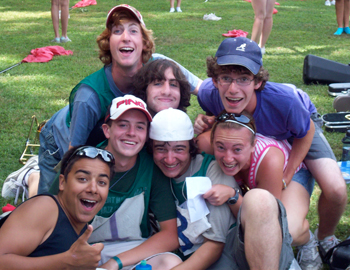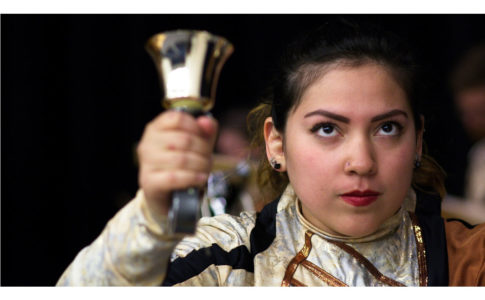Start in June or August? Go away or stay on campus? Work all day and night or plan for play? Although schools structure their band camps in different ways, all strive for an atmosphere that builds the right habits and team bonding to set the tone for the rest of the season. Three top programs share their methods of getting the band started off on the right foot.
Photo by Virginia Kraft
Before loading the buses for its final competition, the West Orange (N.J.) High School marching band sat in the band room watching a video of the season’s first run-through. Several students giggled while watching the performance from band camp. They could see how they had improved since August.
Senior drum major Andrew Denburg knew that the season would be successful after conducting that first run at camp. While the band strives to complete music and drill during every band camp, this year was memorable. This time, the band performed without Dr. Beat pulsing the tempo. Band camp had set the tone for the season. West Orange went on to become the 2009 U.S. Scholastic Band Association (USSBA) Northern State Champions in Group 5 Open.
While most directors agree that band camp prepares their students for the upcoming season, the recipe for success varies among programs. Some bands spend the entire summer prepping for the new season while others are required by state rules to wait until August. Some groups travel to off-campus facilities while others practice on their home turf. Regardless of how band camp is structured, it’s safe to bet that pride, dedication and a bit of sweat are ingredients.
West Orange High School
Preparation for West Orange High School’s new season begins in June. The incoming freshmen meet the rest of the band during a reading rehearsal at school. The group plays through the show music and listens to Director Lew Kelly talk about the show. Kelly saves teaching marching fundamentals and how to read drill charts for a two-day mini-camp in August.
Away We Go
For band camp, the group travels three-and-a-half hours away to Camp Weequahic. Denburg thinks staying in cabins benefits the band. “It helps the kids bond a little more because when you’re living with these people for five days, you get to know them better,” he says. “And the better the group vibe is, the more we get done and the better we are by the end of camp.”
The camp facility also allows the color guard, pit, drum line and winds to have their own practice spaces.
While some members run into financial difficulties, the band works with parents to create payment plans. Sometimes the school will even sponsor a student to partake in band camp. “We offer opportunities for students to fundraise and to use those funds to offset the cost of camp,” Kelly says. “Money is not a reason for a kid not to be part of this band.”
Kelly’s schedule is planned down to the minute and has served as a basic template over the years. The group begins with breakfast at 7:30 followed by stretches and warm-ups at 8:30. Drill setting fills the time until lunch, and then there is a combo of music and drill work in the afternoon. After dinner everyone is on the field until they can’t see, and then they do music rehearsal. Lights usually go out at 10:45 or 11 p.m.
The student leaders are given as much ownership as possible, and Kelly counts on them to run music rehearsals within their sections.
The primary focus at band camp is setting all drill charts and chunking them with memorized music.
A Chance to Unwind
During meal breaks and before bed, students do find time to toss Frisbees and work on traditional skits that they perform at the close of band camp although there are no scheduled team-building activities. Denburg took the stage last year with some friends, and they pretended to be members of Blue Man Group. Band camp ends with the T-shirt unveiling and a dance party.
Marcus High School
In Flower Mound, Texas, Marcus High School’s band camp also ends with a band induction and dance, but the camp differs in structure.
An August Start
To begin, the co-curricular and extracurricular governing board in Texas prohibits band camp from starting any earlier than Aug. 1. This policy may look like a disadvantage because the band competes nationally with others that don’t have these restrictions, but Director Amanda Drinkwater views the rule positively. “It helps us work smarter and be well organized,” she says. “We are less apt to waste rehearsal time.”
Drum major Tim Fitzgerald says that the element of urgency keeps the band improving and helps prevent burnout. To prove the point, Marcus High School placed 4th and took the music caption at the 2009 Bands of America Grand National Championships (BOA).
Pre-Preparations
Although the group cannot host band camp before August, they find other ways to prepare before the prior school year ends. Incoming freshmen attend an after-school marching clinic in May. The 8th graders also get standard songs that they can look at during the summer. Drum majors receive conducting tips from the assistant band director. And before the start of band camp, section leaders prep by going to a two-day leadership camp.
Drinkwater and staff run the leadership camp in the band room. She talks about leadership as if section leaders were employers. “If you were managing a small business, what kind of boss would you want to be?” she asks the section leaders.
On Home Turf
When the 300-member ensemble meets for the two-week band camp, Drinkwater says rehearsing at the high school is more user-friendly than traveling to a sleep-away camp. Band members don’t have to pay additional travel fees. For Marcus High School, setting the entire show to music is not always the first priority. Drinkwater says they focus on the most challenging element of the show, whether it’s music or drill. It is more important that the band solidify concepts and procedures, she says.
Fitzgerald explains that they don’t even begin setting drill until the last couple days of band camp. Rather, the group starts in the parking lot reviewing the position of attention. By the end of band camp, however, students are expected to have mastered certain pieces and must earn their section leader’s approval during music pass-offs.
Spontaneous “Sectionals”
Most of the team-building and section-bonding traditions occur naturally and are not scheduled. For example, the flute section “ding-dong ditches” freshmen’s houses with cookies. And the trumpets bring an artificial Charlie Brown Christmas tree to rehearsals, which they put their trumpets around when instruments aren’t needed. “The section leaders are responsible for making those in their sections feel welcomed,” Fitzgerald says.
South Brunswick High School
The South Brunswick High School Marching Band from Monmouth Junction, N.J., learns the entire show at band camp, but Director Mark Kraft also schedules team-building activities at night. He has been influenced by the George N. Parks Drum Major Academy. South Brunswick marchers sometimes hold hands and twist into the human knot. They must work together to untangle themselves. They also participate in relays and fall backward into one another’s arms to build trust.
In 2009, the group became the first New Jersey band to enter the semifinals round of BOA championship competition.
Open Band Room
The band’s preparation begins as far back as June when the drum major screenings are held and band members audition to join the competitive band. (South Brunswick has both a competitive and non-competitive marching band.) The four drum majors then attend the Drum Major Academy to prepare.
The music is also passed out during the summer. And on Tuesday nights in July, students come to “Open Band Room” to rehearse in sections, learn a new maneuver each week and to partake in a march-off. By the time the musicians get to band camp, they can play their parts memorized.
Work Schedule
In August, the group begins with a 9 a.m. to 3 p.m. two-day camp at the high school. In 2009, the group set at least 50 charts before band camp, says drum major Eric Siegel. On the third day, the band travels to Johnsonburg Camp for the five-day band camp.
The group starts at 8 a.m. with 30 minutes of marching fundamentals followed by drill learning. The group works on music in the afternoon and at night students combine the music and drill.
“As the season goes on, we refine the show and enhance the show from an artistry standpoint.” Kraft says. “But basically all the drill sets are learned, all the music is learned, all the percussion music is learned and all the color guard learned by the time we come home from band camp.”
Common Bonds
But it’s not all work and no play. Sometimes, students have time in the afternoon to go boating or swimming.
Kraft says hosting band camp away from the high school also brings the group together. “Bonding moves slower on a daily basis, but if you live together it happens faster,” he says. “You come together and really care about each other. Instead of people just playing for his/her own benefit, they begin to function as a group and want to make each other excellent.”
On the last night of band camp, Kraft plays the band’s song, “Greatest Love of All.” Afterward, like West Orange and Marcus High Schools, South Brunswick seniors perform skits, and a dance draws the night to a close.
While band camp demands hard work, by mid-October Kraft says, “It’s not uncommon to hear students saying that marching band is ‘the best thing ever.’”


